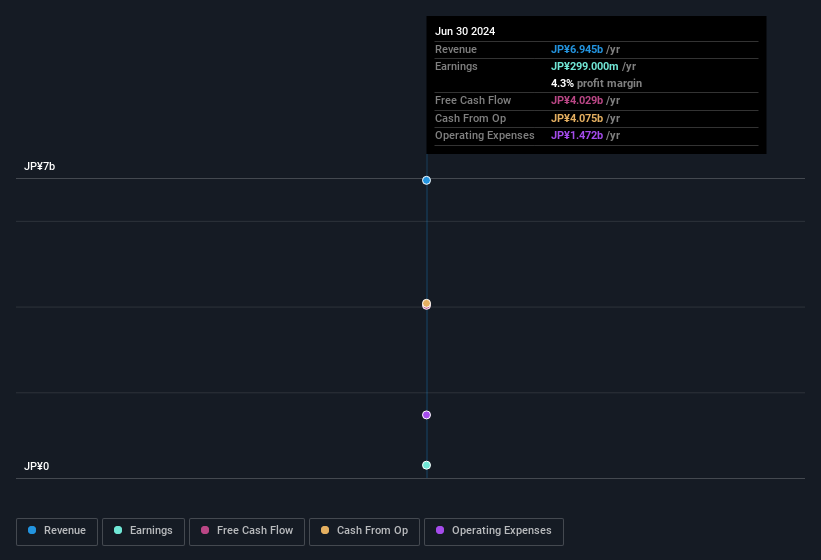HPC SYSTEMS Inc. (TSE:6597) announced a healthy earnings result recently, and the market rewarded it with a strong uplift in the stock price. According to our analysis of the report, the strong headline profit numbers are supported by strong earnings fundamentals.
See our latest analysis for HPC SYSTEMS

Zooming In On HPC SYSTEMS' Earnings
In high finance, the key ratio used to measure how well a company converts reported profits into free cash flow (FCF) is the accrual ratio (from cashflow). To get the accrual ratio we first subtract FCF from profit for a period, and then divide that number by the average operating assets for the period. The ratio shows us how much a company's profit exceeds its FCF.
As a result, a negative accrual ratio is a positive for the company, and a positive accrual ratio is a negative. While it's not a problem to have a positive accrual ratio, indicating a certain level of non-cash profits, a high accrual ratio is arguably a bad thing, because it indicates paper profits are not matched by cash flow. Notably, there is some academic evidence that suggests that a high accrual ratio is a bad sign for near-term profits, generally speaking.
Over the twelve months to June 2024, HPC SYSTEMS recorded an accrual ratio of -3.91. That indicates that its free cash flow quite significantly exceeded its statutory profit. In fact, it had free cash flow of JP¥4.0b in the last year, which was a lot more than its statutory profit of JP¥299.0m. As it happens we don't have the data on what HPC SYSTEMS produced by way of free cashflow, the year before, which is a pity.
That might leave you wondering what analysts are forecasting in terms of future profitability. Luckily, you can click here to see an interactive graph depicting future profitability, based on their estimates.
Our Take On HPC SYSTEMS' Profit Performance
Happily for shareholders, HPC SYSTEMS produced plenty of free cash flow to back up its statutory profit numbers. Because of this, we think HPC SYSTEMS' underlying earnings potential is as good as, or possibly even better, than the statutory profit makes it seem! At the end of the day, it's essential to consider more than just the factors above, if you want to understand the company properly. So if you'd like to dive deeper into this stock, it's crucial to consider any risks it's facing. For instance, we've identified 4 warning signs for HPC SYSTEMS (1 doesn't sit too well with us) you should be familiar with.
This note has only looked at a single factor that sheds light on the nature of HPC SYSTEMS' profit. But there is always more to discover if you are capable of focussing your mind on minutiae. For example, many people consider a high return on equity as an indication of favorable business economics, while others like to 'follow the money' and search out stocks that insiders are buying. While it might take a little research on your behalf, you may find this free collection of companies boasting high return on equity, or this list of stocks with significant insider holdings to be useful.
Valuation is complex, but we're here to simplify it.
Discover if HPC SYSTEMS might be undervalued or overvalued with our detailed analysis, featuring fair value estimates, potential risks, dividends, insider trades, and its financial condition.
Access Free AnalysisHave feedback on this article? Concerned about the content? Get in touch with us directly. Alternatively, email editorial-team (at) simplywallst.com.
This article by Simply Wall St is general in nature. We provide commentary based on historical data and analyst forecasts only using an unbiased methodology and our articles are not intended to be financial advice. It does not constitute a recommendation to buy or sell any stock, and does not take account of your objectives, or your financial situation. We aim to bring you long-term focused analysis driven by fundamental data. Note that our analysis may not factor in the latest price-sensitive company announcements or qualitative material. Simply Wall St has no position in any stocks mentioned.
About TSE:6597
HPC SYSTEMS
Develops, manufactures, and sells high-performance and embedded computers in Japan.
Excellent balance sheet with moderate growth potential.
Market Insights
Community Narratives




